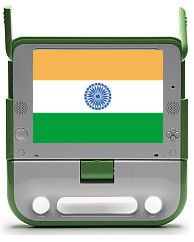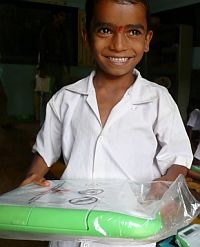This guest article by Shirish Goyal is a response to How would you accelerate the adoption of OLPC in India? and There is No OLPC India Community of Any Form, Shape or Sort.
Some of my friends are talking of no existence of such community and others about the dismal state of the children education in the country with less attention paid by government. The prime focus in all such talks is whether Indian children are using XO laptop or community has access to it by various means. But let me remind all of them that: OLPC has always stated that it is not a laptop project but an education project. For the very same fact, I certainly believe that India has the largest OLPC community in the world.

Therefore, the question is not how to accelerate adoption of OLPC in India or elsewhere but how to unlearn the rudimentary learning and devise new ways of teaching and learning, enhance quality of education, and make this knowledge accessible to all.
Accelerating creativity, imagination and quality education in India
Educators or teachers along with students are the main focus group of education for any community or nation and therefore have to undergo the biggest change for any such revolution to happen. We need teachers, lecturers and professors who are still active learners and keep on adopting the changes and new techniques emerging everyday across the world and share them with the community. They have been assigned the responsibility to build the future and it becomes essential that they teach students how to ask questions and research answers rather than feeding their brains with so called "facts".
A good question has much larger potential to spark interest and imagination than some filtered information from the past.
And are the facts really the facts and how complete are they? It has been repeated time and again that some of the revolutionary thinkers (like Aryabhatta, Jagdish Bose, Newton, Edison, Tesla, Einstein and others) have challenged these very facts and came with their own answers which were accepted by community at large later.
Real world and illusions is equivalent for small children and their minds know no boundaries but we do! In turn, we impose the same on them in the hope that they can understand the problem from our perspective. Who cares? If the problem could have been solved with the same perspective, it would have been solved already. Let the children develop their own perspective. Let their imagination loose and see the possibilities they can come up with.
We can easily infer from the past, the knowledge has always spread from a very small percentage of population. An easiest way to know how much we support creativity and quality learning is by assessing ourselves first. Stand in front of a mirror and ask yourself whatever you know till date, how much of that has been developed by you alone and not learnt from others? This will give everyone a true picture of the kind of learning we want to promote and rejoice in its outcomes later.
Encourage children to speak, write and express their thoughts
Expressing thoughts requires deep understanding of the context and builds interactive learning environment. It also helps in developing their confidence, their individuality to lead by action than just follow others (as most of them have been doing promoted by just listening or dictation mode).
Devise new ways of learning and teaching and sharing knowledge.
We, in India, still follow in most of the cases, a traditional approach of teaching although we have at our disposal the latest tools of technology. How many professors or teachers use computer for more than a PowerPoint presentation, at all in their courses?
I believe the moment we become aware of the fact that a laptop or computer system is a complete lab in itself for any course providing far better means of creative exploration and comes at much cheaper price than building and supporting the large labs; the very question of whether anyone should invest in ICT initiatives doesn't remain. Then the governments and other parties will not have to be convinced. It will happen automatically and community will rise to the challenge of fulfilling this goal.
Community building and support in India
We, as Indians, are already executing one of the largest education project in the world supporting billions of children and the very fact that we care to improve our ways to tackle the challenges in learning and sharing across this vast population, our ideas resonate with the basic OLPC mission and it makes us the largest OLPC community across the world.
If we start taking note of the number of active OLPC volunteers, several such communities are already contributing in their own ways , spread(ever growing) across India in different states and, solving their own set of challenges and sharing their deep expertise of real ground work. The shape and size of this community looks pretty like India! Those who do not believe this statement can join http://wiki.laptop.org and see and experience the wonderful work their fellow Indians have been putting their brains to and contributing to knowledge initiatives globally.
Some of them form the core team for developing Sugar collaborative environment, while others developing software over this platform and training teachers and children how to initiate and adopt technology. India is one of the countries having its own Devanagri Keyboard layout for XO laptops. Status for some of the software language translations on XO: Hindi (99%), Bengali (87%), Tamil (100%), would have never seen this day without active volunteers from India.
Anyone who wants to collaborate can always post his/her queries to OLPC community and will surely find hands rising in their regions.
It doesn't require an approval from government but a strong will to build such community
We have a lot of such enthusiastic volunteers who are actively involved in one forum or the other helping others to bring such a change and spread the same passion. And comparing this number with the overall population of India will always give a wrong picture. OLPC's success in other countries can never be compared to India because India is a growing economy with immense talent and the government has to think objectively before committing to any such change.
Of course, it poses its own problems of delay in adoption of technology and bearing the loss later. But as said earlier, none of us is limited by any organization or opportunity if we are strong enough to lead and take this challenge. Every volunteer is free to participate and contribute to the OLPC mission of collaborative education through its Contributor's program.
Time is not far when India along with other neighbouring countries like Nepal and Sri Lanka will form its own Asian hub of shared learning supported by OLPC, volunteers and educators. It might be easy said than done but then none of the changes of this large size is easy to accomplish and only thing we can do is to participate and sweat to turn it to a reality rather than blaming others or ourselves for not rising to the challenge later.
Are YOU ready to take this challenge?
Regards,
Shirish Goyal
(OLPC Support Gang)



I don't see a single active community in http://wiki.laptop.org/go/OLPC_India. Most of the links there are around a year or two old, with little action in between. (Khairat happened 3 years ago)
It does not take much to create a keyboard layout for the XO - the Devanagari keyboard mentioned in the article is a slightly modified rehash of the standard Inscript keyboard which has been in the GNU/Linux/Xorg ecosystem for years.
Is there any published number on how many machines with that particular layout were actually built ?
As for translations - translations for Bengali was done from Bangladeshi volunteers, a large part of the initial work for Tamil translations was done by Sri Lankan volunteers, and I know from reliable sources that Hindi translations were paid for (ie: not a community effort).
Activity on the Indian mailing list is nil (and the list is moderated for all posts, which is probably the worse thing you can do to a "community" mailing list)
If India does have the largest OLPC "community" in the world, where is the activity, where are its members ?
It's amazing how the article makes blatantly wrong claims like "India can be considered the largest nation in the world". In terms of what ?
Community is solid, concrete action. Not the idle hand-waving that is repeated again and again in this article.
You cannot have a community where you decide to throttle and muzzle communication and exchange of ideas by moderating (or rather, censoring) mailing lists, and kicking out people from the list when you do not agree with them (see http://lists.laptop.org/pipermail/india/2008-November/000850.html for details in case you are interested).
I will have to disagree with Shirish as well. I would say that even OLPC News Forum is a larger, more active community than OLPC India.
Now that doesn't mean there isn't an OLPC India community at all - I know that the efforts of Satish Jha should be counted as a community all in itself - but its definitely not the largest in the world. The largest potential, maybe, but not in action.